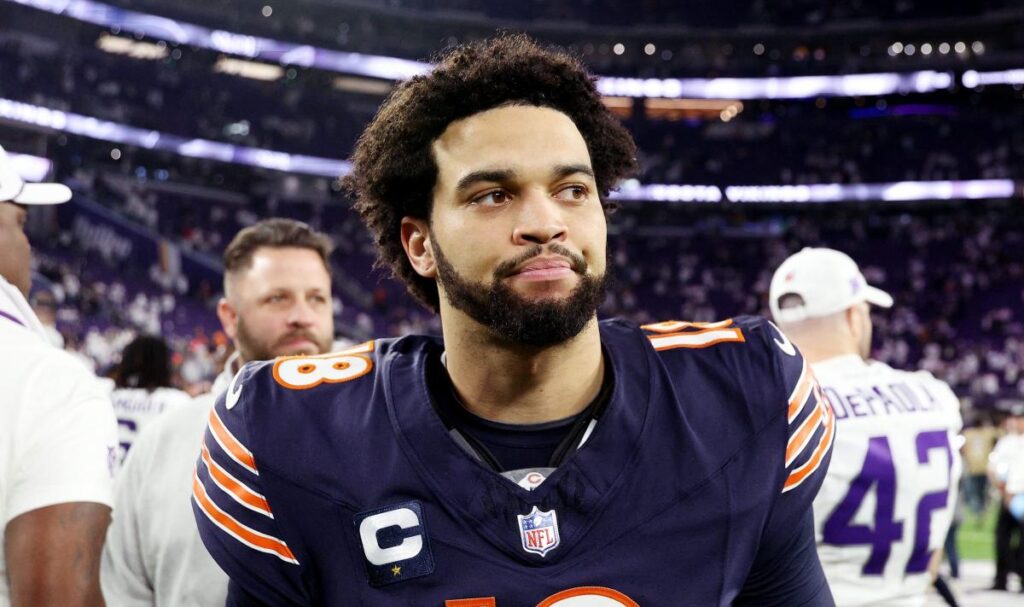The Chicago Bears’ dismal 4-10 season has emboldened criticisms surrounding their handling of quarterbacks, particularly in the case of rookie Caleb Williams. This season has unravelled inexorably, highlighted by an eight-game losing streak that has left the franchise and its fans in despair. In hindsight, the forecast laid out by Carl Williams, Caleb’s father, becomes increasingly relevant. Carl has characterized the NFL Draft system as deeply flawed, claiming it often places young, gifted players like his son in dire situations with dysfunctional franchises that present a significant risk to their development and success in the league. The essence of his argument is that rather than facilitating a path to success, the draft system can be a means of setting up young players for failure.
Carl’s concerns included suggesting that Caleb might consider an “Eli Manning” move—refusing to join a team with a tarnished reputation to protect his burgeoning career. However, defying those warnings, the younger Williams expressed a willingness to embrace the challenge and break the Bears’ cycle of quarterback mismanagement. This bold assertion seemed filled with optimism, but as the season unfolded, Caleb’s demeanor began to mirror that of a disheartened player grappling with the weight of expectations and the very real struggles of the organization surrounding him. The irony is striking; both Carl and Caleb might have benefitted from heeding the wisdom of avoiding such a tumultuous situation.
As Caleb’s confidence wavers under the relentless pressure of a failing team, the issues at play transcend his individual performance. Historically, the Bears have failed to cultivate their quarterbacks, and the current trajectory suggests that this legacy will likely continue. With the resurgence of other quarterbacks such as Baker Mayfield and Geno Smith finding success in new environments, it’s evident that organizational dysfunction can stifle talent rather than nurture it. The narrative that young players fail due to personal shortcomings is misleading; more often, it’s the structural issues within a team that inhibit their growth. The situation with the Bears illustrates this point poignantly, as their perpetual struggle in developing quarterbacks stands in stark contrast to the success of others who have transitioned to more competent franchises.
Despite the grim outlook, there is still potential for Caleb Williams to carve out a successful career in the NFL. However, the expectation is that significant changes need to unfold within the Bears organization for that to happen. With the team’s history of missteps in quarterback development looming large, Caleb’s future in Chicago remains uncertain. The franchise must work diligently to regain credibility and convince fans and analysts that they can break free from the patterns of past failures. Until they demonstrate a commitment to nurturing and maximizing the abilities of their quarterbacks, they continue to exist under a cloud of skepticism. The onus remains firmly on the Bears to prove that they can offer a supportive environment rather than merely repeating the cycles of the past.
In retrospect, the Williams family may have benefited from taking a more theatrical approach to the draft, creating a scenario that would galvanize public support and force the organization to confront its mismanagement of young talent. The notion of turning the draft process into a public spectacle was an avenue Carl Williams could have exploited to shield Caleb from the burdens associated with joining a team notorious for its ineptitude. While such a strategy may have elicited controversy, the potential long-term benefits of avoiding the pitfalls of playing for the Bears could have made it worthwhile. Ultimately, this is a reflection on the need for restructuring and rethinking how organizations approach player development, specifically concerning the very fragile early careers of quarterbacks.
As the season draws to a close, the Bears find themselves at a crossroads, whether in terms of leadership, personnel, or philosophy around player development. Caleb Williams certainly remains a player with immense potential, capable of leading a team to greatness—but whether the Bears can support and nurture that growth remains in question. Past experiences indicate a challenging road ahead, and the timing may not be right for him to flourish in Chicago. For now, the missed opportunities and the warnings ignored serve as valuable lessons for both the player and the organization, urging a reevaluation of their approach to success in the unforgiving landscape of the NFL.

